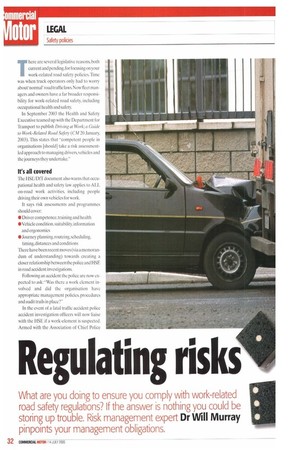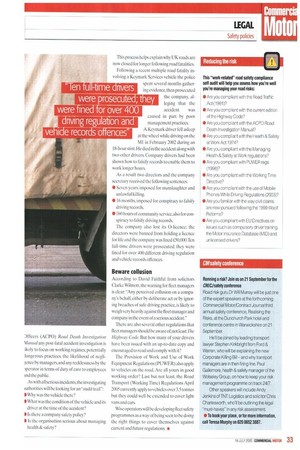Regulating risks
Page 32

Page 33

If you've noticed an error in this article please click here to report it so we can fix it.
What are you doing to ensure you comply with work-related road safety regulations? lithe answer is nothing you could be storing up trouble. Risk management expert Dr Will Murray pinpoints your management obligations.
There are several legislative reasons, both current and pending, for focusing on your work-related road safety policies. Time was when truck operators only had to worry about 'normal' road traffic laws. Now fleet managers and owners have a far broader responsibility for work-related road safety, including occupational health and safety.
In September 2003 the Health and Safety Executive teamed up with the Department for Transport to publish Driving at Work; a Guide to Work-Related Road Safety (CM 20 January, 2003). This states that -competent people in organisations [should] take a risk assessmentled approach to managing drivers, vehicles and the journeys they undertake."
Its all covered
The HSE/DfT document also warns that occupational health and safety law applies to ALL on-road work activities, including people driving their own vehicles for work.
It says risk assessments and programmes should cover: • Driver competence, training and health • Vehicle condition, suitability, information and ergonomics • Journey pl anning,routeing,scheduli ng, timing, distances and conditions There have been recent moves (via a memorandum of understanding) towards creating a closer relationship between the police and HSE in road accident investigations.
Following an accident the police are now expected to ask: "Was there a work element involved and did the organisation have appropriate management policies, procedures and audit trails in place'?"
In the event of a fatal traffic accident police accident investigation officers will now liaise with the HSE if a work-element is suspected. Armed with the Association of Chief Police Dfficers (ACPO) Road Death Investigation Vanua' any post-fatal accident investigation is ikely to focus on working regimes, potentially langerous practices, the likelihood of negli;ence by managers, and any recklessness by the )pera tor in terms of duty of care to employees ind the public.
As with all serious incidents, the investigating iuthorities will be looking for an "audit trail": DWI-iv was the vehicle there?
'What was the condition of the vehicle and its driver at the time of the accident?
D Is there a company safety policy?
Is the organisation serious about managing health & safety? This process helps explain why UK roads are now closed for longer following road fatalities.
Following a recent multiple road fatality involving a Kcymark Services vehicle the police spent several months gathering evidence,then prosecuted the company, alleging that the accident was caused in part by poor management practices. A Keymark driver fell asleep at the wheel while driving on the M1 in February 2002 during an 18-hour stint. He died in the accident along with two other drivers. Company drivers had been shown how to falsify records to enable them to work longer hours.
As a result two directors and the company secretary received the following sentences: • Seven years, imposed for manslaughter and unlawful killing.
• 16 months, imposed for conspiracy to falsify driving records.
• 160 hours of community service, also for conspiracy to falsify driving records.
The company also lost its 0-licence; the directors were banned from holding a licence for life and the company was fined f50,(100.Ten full-time drivers were prosecuted; they were fined for over 400 different driving regulation and vehicle records offences.
Beware collusion According to David Faithful from solicitors Clarke Wilmott, the warning for fleet managers is clear: "Any perceived collusion on a company's behalf, either by deliberate act or by ignoring breaches of safe driving practice, is likely to weigh very heavily against the fleet manager and company in the event of a serious accident."
There are also several other regulations that fleet managers should be aware of;not least The Highway code. But how many of your drivers have been issued with an up-to-date copy and encouraged to read and comply with it?
The Provision of Work and Use of Work Equipment Regulations (PUWER) also apply to vehicles on the road. Are all yours in good working order? Last but not least, the Road Transport (Working Time) Regulations April 2005 currently apply to vehicles over 3.5 tonnes but they could well be extended to cover light vans and cars.
Wise operators will be developing fleet safety programmes as a way of being seen to be doing the right things to cover themselves against current and future regulations. •










































































































































































































